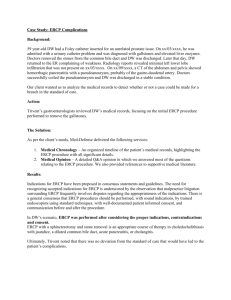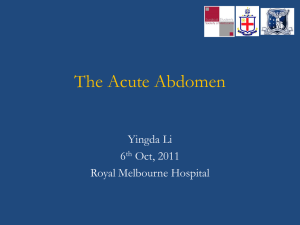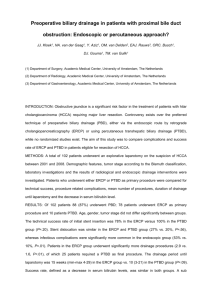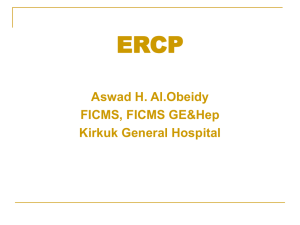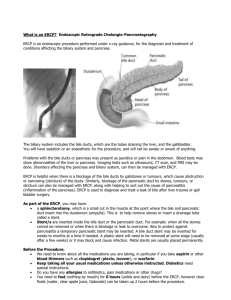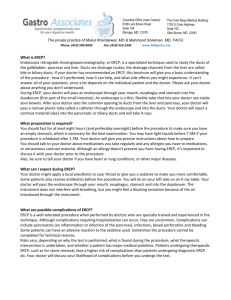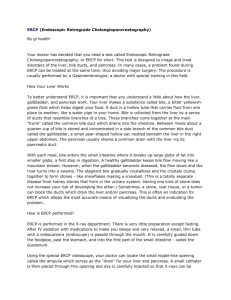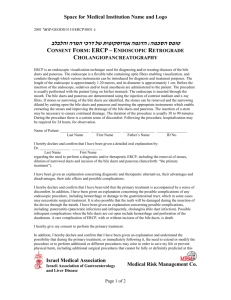Word 2003
advertisement
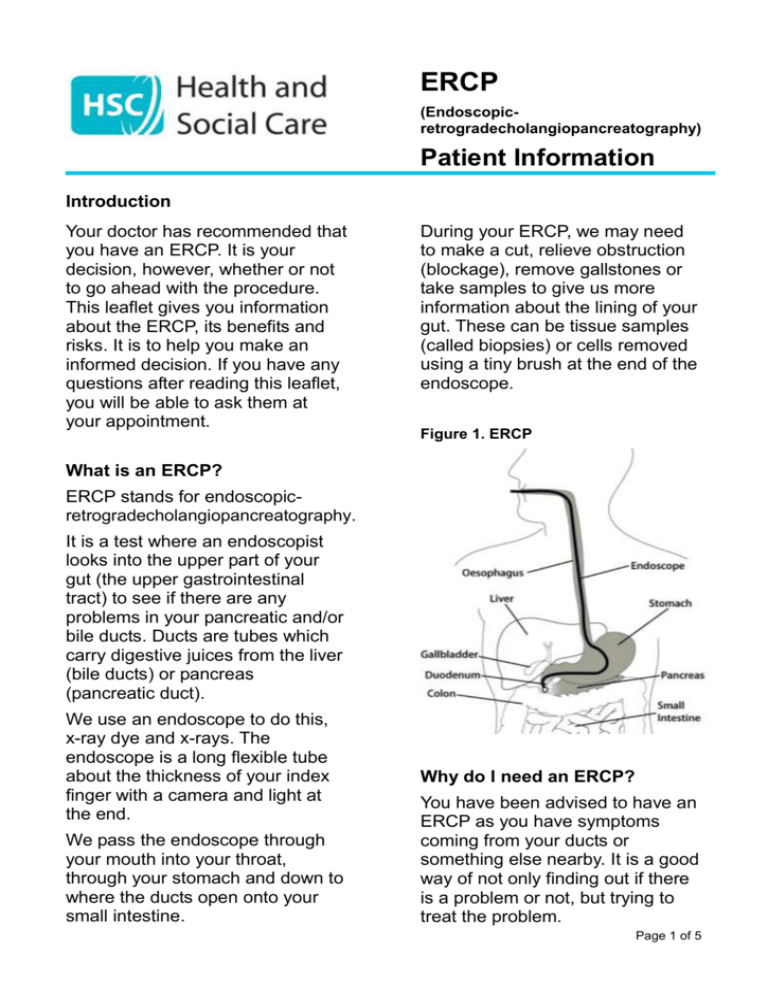
ERCP (Endoscopicretrogradecholangiopancreatography) Patient Information Introduction Your doctor has recommended that you have an ERCP. It is your decision, however, whether or not to go ahead with the procedure. This leaflet gives you information about the ERCP, its benefits and risks. It is to help you make an informed decision. If you have any questions after reading this leaflet, you will be able to ask them at your appointment. During your ERCP, we may need to make a cut, relieve obstruction (blockage), remove gallstones or take samples to give us more information about the lining of your gut. These can be tissue samples (called biopsies) or cells removed using a tiny brush at the end of the endoscope. Figure 1. ERCP What is an ERCP? ERCP stands for endoscopicretrogradecholangiopancreatography. It is a test where an endoscopist looks into the upper part of your gut (the upper gastrointestinal tract) to see if there are any problems in your pancreatic and/or bile ducts. Ducts are tubes which carry digestive juices from the liver (bile ducts) or pancreas (pancreatic duct). We use an endoscope to do this, x-ray dye and x-rays. The endoscope is a long flexible tube about the thickness of your index finger with a camera and light at the end. We pass the endoscope through your mouth into your throat, through your stomach and down to where the ducts open onto your small intestine. Why do I need an ERCP? You have been advised to have an ERCP as you have symptoms coming from your ducts or something else nearby. It is a good way of not only finding out if there is a problem or not, but trying to treat the problem. Page 1 of 5 What happens during an ERCP? An ERCP is usually carried out in the Radiology Department. We may numb the back of your throat by spraying some local anaesthetic. This can taste unpleasant. We will also give you a sedative to help you relax. We may also give you a painkiller. If you have stones, we may move them to your bowel so you can pass them out when you go to the toilet. At the end of the ERCP, we gently remove the endoscope. An ERCP can last from 30 minutes up to an hour depending on what is done. We will ask you to put a plastic mouth guard between your teeth. This aims to protect your teeth and any bridge work you have had done. You will be given time to recover. You may be given oxygen through the mouth guard. We will monitor your breathing, pulse and oxygen level. Most ERCPs are done without any problem. The benefit from this procedure needs to be weighed up against the small risk of complications. Any complication could mean you need to stay longer in hospital for treatment. We will then pass the endoscope down your throat and into your stomach and duodenum. We pass air down the endoscope into your stomach to help pass the endoscope along. This may cause you to feel bloated, want to belch and may cause some mild stomach pains. X-ray dye is injected into your pancreatic or bile ducts. We then take x-rays. If the x-rays show a narrowing or blockage in the bile duct, we can put a stent (a small wire-mesh or plastic tube) inside to open it wide. This then allows bile to drain in the normal way. You will not be aware of the stent once it is put in. If we take samples of tissue or cells it is painless. Are there any side-effects or possible complications (risks)? Occasionally, having an ERCP can result in damage to the gut. Heavy bleeding happens in around one in 50 patients. If you are taking medication to thin your blood, you should tell us (see next page). Perforation (making a hole in the gut) happens in around one in 100 patients. The risk of pancreatitis (inflammation of the pancreas) is one person in 20. This usually settles in a few days but can be serious in some cases. The risk of serious infection is one person in 200. This can usually be treated successfully. In rare cases, ERCP can cause death. Some people have a mild sore throat for a day or so afterwards. Page 2 of 5 If you have a sedative, you may feel tired or sleepy for several hours. Risks from sedation are different for each person and they depend on the type of drug that is used. Serious complications are rare. The sedative can affect your breathing making it slower, more shallow and possibly stopping it altogether. The sedative may occasionally cause problems with blood pressure. Some people have an allergic reaction although this is very rare. We can usually identify and treat any such problems quickly if they occur. You would have slightly more risk of developing a chest infection or pneumonia following an ERCP. If you are worried about possible risks, ask at your appointment. In some cases, we are unable to complete the ERCP, and may need to ask you to have another one or to have a different test. Is there an alternative? There are alternative tests which you may have already had or which have been discussed with you. Most of these are scans. Scans however do not let us treat any problems if we find them. An ERCP allows tissue samples to be taken, stones to be removed or a stent placed. I have decided to proceed with an ERCP. How do I prepare? It is important to read and follow these instructions carefully. Your gut needs to be empty so that we can get a clear view. If you eat or drink something, your test will need to be cancelled. For morning appointments, do not eat or drink from midnight the night before. For afternoon appointments, do not eat or drink anything after 7:00am on the day of your appointment. If you are having your ERCP as an Outpatient (i.e. not staying at hospital overnight), you must arrange for somebody to take you home and stay with you overnight. If you normally take heart or anticonvulsant medication, take it as usual on the day of your test. If you take it with water, you must only take a very small sip. If you are taking iron tablets, stop taking them five days before your appointment. Contact us for advice if you are diabetic or are taking Aspirin, Warfarin, or Plavix (clopidogrel). Bring a list of your medications and dosages with you. Leave all valuables at home. Page 3 of 5 What happens when I arrive for my ERCP? You will be met by a nurse who will ask you some questions. You will be able to ask the nurse questions if you have any. The nurse will make sure that you understand the ERCP. The nurse will take and record your heart rate and blood pressure. If you are diabetic, the nurse will take and record your blood glucose level. You will be seen by the endoscopist for a quick update on your symptoms. If you are happy to proceed with the ERCP, you will be asked to sign your consent form if you have not already done so. This unit is a training centre for endoscopy. This means that trainees (supervised by qualified staff) may be involved in your care. If you do not want trainees to carry out your ERCP or to be present, please inform us when you arrive. What happens after the ERCP? You will return to the ward in your bed. You will be quite drowsy. The nurses will observe you. They will advise you when you can eat and drink, and when you can go home. There are certain things you must not do while you are drowsy from the sedative. Your nurses will advise you. Before you leave, we will explain your results and what happens next. We send similar information to your GP/consultant. Aftercare There is some important information on the next page so that you know what to do if you have any serious problems. Please ask us if you would like information about how we use and store tissue samples and hospital records (including images). Delays to your appointment We also deal with emergencies. These can take priority over your appointment, meaning we may have to ask you to wait or to change your appointment to another day. Page 4 of 5 Aftercare What if I need to cancel my ERCP? If any of the following happen within 48 hours after your ERCP, you need to seek help: chest or abdominal/tummy pain that becomes more severe, and is different or more intense than any pains that you would ‘usually’ have breathing difficulties fever (raised temperature) vomiting blood passing very black stools. If you are unable to keep your appointment, please tell us as soon as possible. Unit contact details About this information If this is after you leave hospital, contact us on the number provided, between 9am – 5pm Monday – Friday. Contact your GP or nearest A&E department outside these hours. Say you have had an ERCP. If you have a persistent sore throat, contact your GP and tell them you have had an ERCP. This leaflet is for general information only and is not a substitute for professional medical advice. Every effort is taken to ensure that it is accurate and consistent with current knowledge and practice at the time of publication. It was adapted from Southern Health & Social Care Trust information by Ms Seanin Ward. It was adapted by the N Ireland Nurse Endoscopists Group and then approved by the regional Modernising Endoscopy Services project team. Complication rates were drawn from ‘Evidence Summary: Patient Information for the NHS Bowel Cancer Screening Project’ (2008) and ‘Complications of gastrointestinal endoscopy,’ British Society of Gastroenterology (http://www.bsg.org.uk /images/stories/docs/clinical/guidelines/ endoscopy/complications.pdf accessed 27/01/2010) where cardio-pulmonary and sedation-related complications are discussed in detail. If you feel we should include other information in this leaflet, please tell us so we can consider your suggestion. This leaflet can be made available on request in alternative formats and in other languages to meet the needs of those who are not fluent in English. Publication date: May 2010 Review date: May 2012 Page 5 of 5
